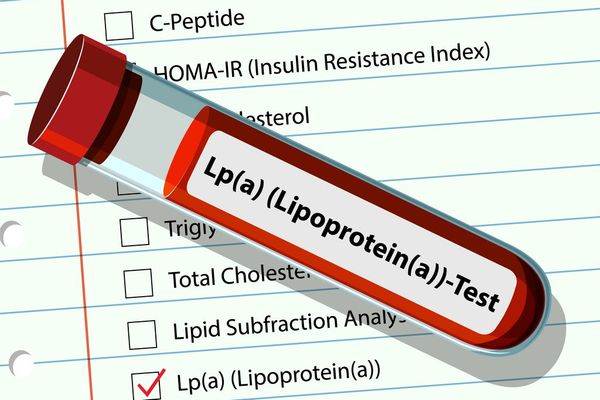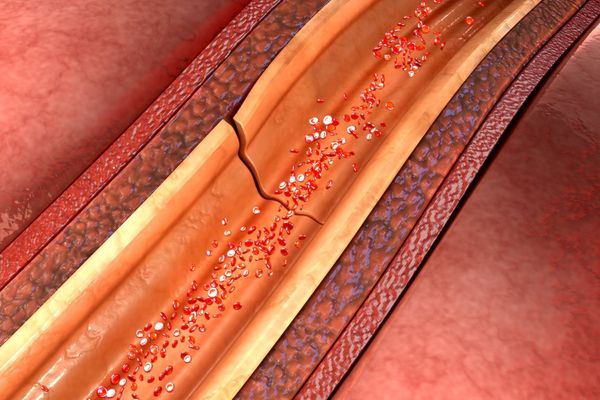For many Americans working toward better heart health, an important first step is getting cholesterol to a healthy level. Diet and exercise are important steps to reduce high cholesterol. However, many people may find that with diet and exercise alone, cholesterol numbers are not where they should be.
More than one hundred million Americans have high cholesterol, an important risk factor for heart disease. Though diet is very important, many people don't realize that cholesterol is also produced in the body based upon heredity.
Learning about your family health history is important—we recommend talking to your family about their health and creating a family health tree. Bringing this information to your next doctor visit will help you discuss your family history regarding cholesterol and other hereditary health concerns.
Understanding Cholesterol
What you eat affects your health, by raising or lowering the blood fats (cholesterol, triglycerides) that circulate through your body. Some foods increase your levels of total cholesterol, LDL or "bad" cholesterol and triglycerides. Over the years, excess cholesterol and fat are deposited in the inner walls of the arteries that supply blood to your heart. Eventually, these deposits can make your arteries narrower and less flexible, a condition known as atherosclerosis. Left unchecked, this buildup can lead to heart attack, stroke and death.
Additionally, because of your family health history, your body may be genetically predisposed to make more cholesterol than you may need, in addition to the cholesterol from your food intake.
Know your numbers!
Each one of us has a cholesterol goal level, based upon our individual risk factors and our risk for heart disease. The National Cholesterol Education Program (NCEP) recommends that everyone age 20 and over have a blood cholesterol test every five years to check their cholesterol levels. To learn more about your goal, visit www.nhlbi.nih.gov/chd for the National Cholesterol Education Program's Live Healthier, Live Longer Web site.
If your cholesterol levels are mildly to moderately higher than your goal, making a few dietary changes may be all you need to get back on track.
According to current NCEP recommendations, people with coronary heart disease or others considered to be at high risk for coronary heart disease generally have an LDL cholesterol goal of less than 100 mg/dL. An LDL cholesterol goal of less than 70 mg/dL is a therapeutic option for people considered to be at very high risk. Work with your doctor to develop a plan to help reduce your LDL cholesterol number to goal.
Here are guidelines for your cholesterol and triglyceride levels according to NCEP guidelines (new guidelines will be released in 2010):
Total blood cholesterol levels | |
| less than 200 mg/dL | Desirable |
| 200 to 239 mg/dL | Borderline high |
| 240 mg/dL or above | High |
LDL blood cholesterol levels | |
| less than 100 mg/dL | Optimal |
| 100 to 129 mg/dL | Near optimal/above optimal |
| 130 to 159 mg/dL | Borderline high |
| 160 to 189 mg/dL | High |
| 190 mg/dL and above | Very High |
HDL blood cholesterol levels | |
| above 60 mg/dL. Levels above 60 mg/dL are considered especially beneficial and can offset risk factors for heart disease, according to NHLBI. The higher the level, the healthier it is. | Optimal |
| 50 to 60 mg/dL for women; 40 to 50 mg/dL for men | Average |
| less than 50 mg/dL for women; less than 40 mg/dL for men. Below these levels is considered a major risk factor for heart disease. | Low |
Triglyceride levels | |
| less than 150 mg/dL | Normal |
| 150 to 199 mg/dL | Borderline High |
| 200 to 499 mg/dL | High |
| 500 mg/dL or higher | Very high |
It is important to remember that these recommendations are for healthy individuals, not for women with existing risk factors for heart disease, such as diabetes, kidney disease, being overweight, smoking or having a family history of heart disease. If you are at risk for heart disease, your target goals likely will be lower.
Fighting Back
There are things that you can do now to help you gain a better understanding of your risk factors and perhaps lower your chances of high cholesterol and heart disease. For starters, it's important that you eat right, get plenty of exercise, as recommended by your physician, and begin to understand your family health history. A healthy diet may help reduce total cholesterol. In general, you want to get "good" cholesterol higher and "bad" cholesterol lower.
You can still enjoy a wide variety of foods by making healthful dietary choices and changes.
If elevated cholesterol is part of your family genetics, or you have other conditions such as heart disease or diabetes, you may need medication in addition to eating a heart-healthy diet. But whether you have normal cholesterol, high levels, or are currently taking a cholesterol-lowering drug, eating a healthy diet is important for everyone.
Good fats/bad fats
Fats can be good for you and your heart, when they're the right kind and consumed in limited amounts; but even good fat is packed with calories.
Those include monounsaturated and polyunsaturated fats, which decrease "bad" cholesterol, and omega-3 fatty acids, which lower triglycerides.
- Unsaturated fats are liquid at room temperature.
- Monounsaturated fats include olive oil, canola oil and peanut oil.
- Polyunsaturated fats include corn oil, safflower oil and soybean oil.
Saturated fats are the bad guys that may endanger your heart. They increase LDL or "bad" cholesterol more than anything else in your diet.
- Saturated fats, found mostly in animal products, are hard at room temperature or in the refrigerator. Think butter, shortening, fat on and in meat and poultry skin. Whole milk or two-percent milk products, half-and-half and cream all have a lot of saturated fat.
- Tropical oils—coconut, palm and palm kernel oils—also contain a lot of saturated fats. These oils are used in commercially baked crackers, cookies and non-dairy creamers.
- Foods containing saturated fats often also contain high amounts of cholesterol, which is only found in animal products.
Trans fats are another culprit to watch out for.
- Trans fats raise "bad" cholesterol.
- Trans fats are found in foods made with hydrogenated or partially hydrogenated oils—stick margarine and some store-bought cookies and cakes, fast-food French fries, potato chips and other snacks.
- Read your food labels before purchasing. If there are .5 grams or less of trans fats in an item, the company can claim 0 trans fats on the label, so check the ingredient list for hydrogenated oils.
Heart-Healthy Choices
1. Switch your dairy
- Make the change from whole or two-percent milk to one-percent and then to skim, for drinking and in recipes. Or try almond milk or rice milk for a nondairy alternative.
- Use low-fat or nonfat sour cream, yogurt, cream cheese and ice cream.
2. Choose lean cuts
- Beef tenderloin, sirloin, eye of round, ground beef with 10 percent or less fat and pork tenderloin are good choices.
- Other alternatives include white meat chicken or turkey.
- Remove the skin before cooking any poultry.
3. Cook with monounsaturated or polyunsaturated Oils
- These include olive, canola, peanut, safflower, sunflower, sesame and soybean oils.
4. Use more plant-based proteins instead of animal products
- These include beans and peas—black beans, kidney beans, pinto beans, chickpeas, lentils—and tofu or soy. Try veggie burgers (soy-based or grain-based) for an alternative to beef.
5. Boost your intake of foods that are high in soluble fiber
- This type of fiber binds to cholesterol in the digestive tract and helps remove it from your body. Good sources include oatmeal, oatmeal bread, oat bran cereal, beans and peas, apples, bananas and citrus fruits.
6. Increase whole grains in your diet
- Choose bread with at least 3 grams of dietary fiber per slice, whole-grain pastas and brown rice.
7. Use products containing plant sterol and stanol esters
- These components help keep your body from absorbing cholesterol.
- Consuming two to three grams a day decreases LDL cholesterol by 6 percent to 15 percent.
- Food products that have added cholesterol-lowering sterols and stanols include margarines, orange juice and yogurt.
8. Eat fatty fish twice a week
- Choose wild salmon over farm-raised to reduce possible toxin exposure.
- Pregnant or nursing women and children should limit tuna intake to 6 ounces a week and avoid swordfish, due to concerns about methyl mercury levels.
9. Increase the amounts of fruits and vegetables you eat
- Most women should have 1-1/2 cups of fruit and 2 to 2-1/2 cups of vegetables (without cheese sauce!) every day, according to new guidelines.
- Adding more of these to your diet fills you up, adds fiber and important nutrients and helps replace foods with saturated fats.
10. Keep an eye on dietary cholesterol
- Dietary cholesterol, such as is found in eggs, dairy products and some other foods, may raise cholesterol in the blood slightly, but newer studies find that consumption of dietary cholesterol is unlikely to substantially increase risk of coronary heart disease or stroke among healthy men and women. If you have other existing health conditions or risk factors for heart disease, such as diabetes, kidney disease, being overweight, smoking or having a family history of heart disease, you may need to monitor dietary cholesterol more closely.
- Egg yolks are filled with dietary cholesterol—213 milligrams in each. If you have elevated cholesterol, the National Cholesterol Education Program recommends you keep your consumption under 200 milligrams per day.
- Egg whites are cholesterol-free, so use two for each whole egg in recipes, or use cholesterol-free egg substitute, which works well in baking and omelettes.
Heart-Healthy Tips for Eating Away from Home
Here's how to eat out and have a terrific meal without taking in too much fat and cholesterol:
- Preparation counts. Order your food fresh, sautéed, grilled/broiled, or poached. If sautéed or broiled, ask for it to be cooked with olive oil or without fat. Have sauces served on the side, so you add only what you need.
- Divide and conquer. Resist the pitfalls of inflated portions by eating only half of what you order. Take the rest home for an easy lunch or dinner the next day. Ask if you and your dining partner can share an entrée, with each of you ordering individual salads.
- Balance. Have the nachos if you really want them, but order a healthy entrée. Dessert isn't a no-no—pick fresh fruit or sorbet. Enjoy the bread or rolls, just skip the butter and drizzle on olive oil.
- Sip slowly. Wine may raise HDL "good" cholesterol a bit, but there's also evidence it can boost your triglyceride levels.
- Fast food stops are OK. Most fast-food restaurants now offer healthier items than a bacon double cheeseburger. Depending upon which chain you visit, you may find salads (ask for nonfat or olive oil dressings), grilled chicken, yogurt, baked potatoes and fresh fruit cups.
- Look for a heart-healthy symbol. Some restaurants put a heart or other sign next to healthful menu items. Choose from those.





